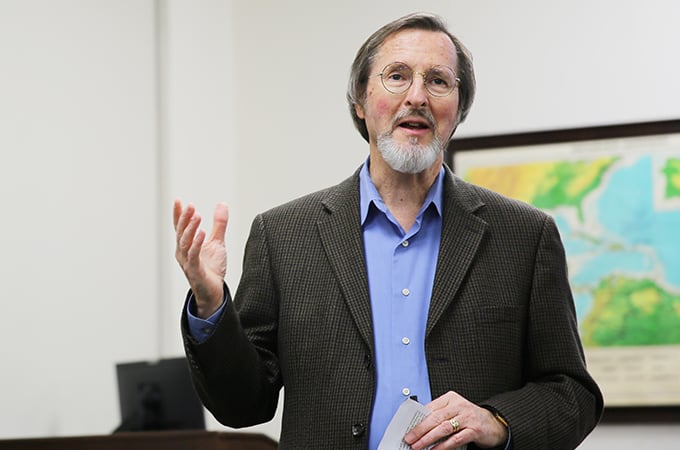How did the Earth change from a planet where humans were rare to a place where they are seemingly everywhere? Monty Hempel, the Hedco Professor and director of the Center for Environmental Studies at the University of Redlands, who directs the University’s Center for Environmental Studies, is creating a 10-part video series on this very topic.
On October 17, Hempel hosted a screening of three of these films.
A 22-minute film titled Exploring the Anthropocene was first up. “Anthropocene” refers to the period of history, beginning with the atmospheric testing of nuclear weapons in the 1950s, in which human behavior has influenced the climate and environment.
Hempel, who narrates the films, explains how oil and gas production, industrial agriculture, and other factors are jeopardizing natural spaces. Production of clothing and aluminum is contributing to the deposit of microplastics in water, soil, and food chains. In addition to harming the environment, these small, barely visible pieces of plastic make their way into the human body through food and beverage consumption, resulting in adverse health effects.
So what can we do to help? “Building sustainable communities requires emotional intelligence, not just science,” said Hempel. “I want to work toward a future that is green, prosperous, fair, and inspirational.”
In effort to illustrate how emotional intelligence can contribute to a better environment, Hempel played a second film that he wrote, directed, and produced, titled Eye to Eye with Whales. In the film, he narrates an encounter he had with a whale off the coast of Australia while on a diving expedition in the Great Barrier Reef.
There, Hempel came across a pod of whales and spent some time interacting with them. During this experience, he was able to look into the eye of a whale, which, he notes, was probing, intelligent, and expressive. He was awed by the interaction.
“This film is a tribute to the power of animals,” he said. “I came away from this experience with the realization that whales are not resources or giant objects of amusement. It was very hard for me to shake the feeling of connection with the whale—an emotion I’m not supposed to have as a scientist.”
In order to ease human’s impact on the environment, Hempel says that we need to develop empathy and realize our interdependence with other species. Animals are a source of wonder, Hempel suggests, and they are vital to the Earth’s future.
With a duration of just over three minutes, Hempel’s third and final film displayed the beauty of the Republic of Palau, an island in the western Pacific Ocean. Composed of underwater, land, and aerial footage, the film explores the country’s marine species, geographical vegetation, and white, sandy beaches.
In closing, Hempel urged the audience to ponder the messages of his films. “Natural sources of wonder will combat the imagination crisis that is plaguing the human population,” he said. “Technology is not the answer—nature is.”
Learn more about Hempel and U of R’s Environmental Studies programs.






